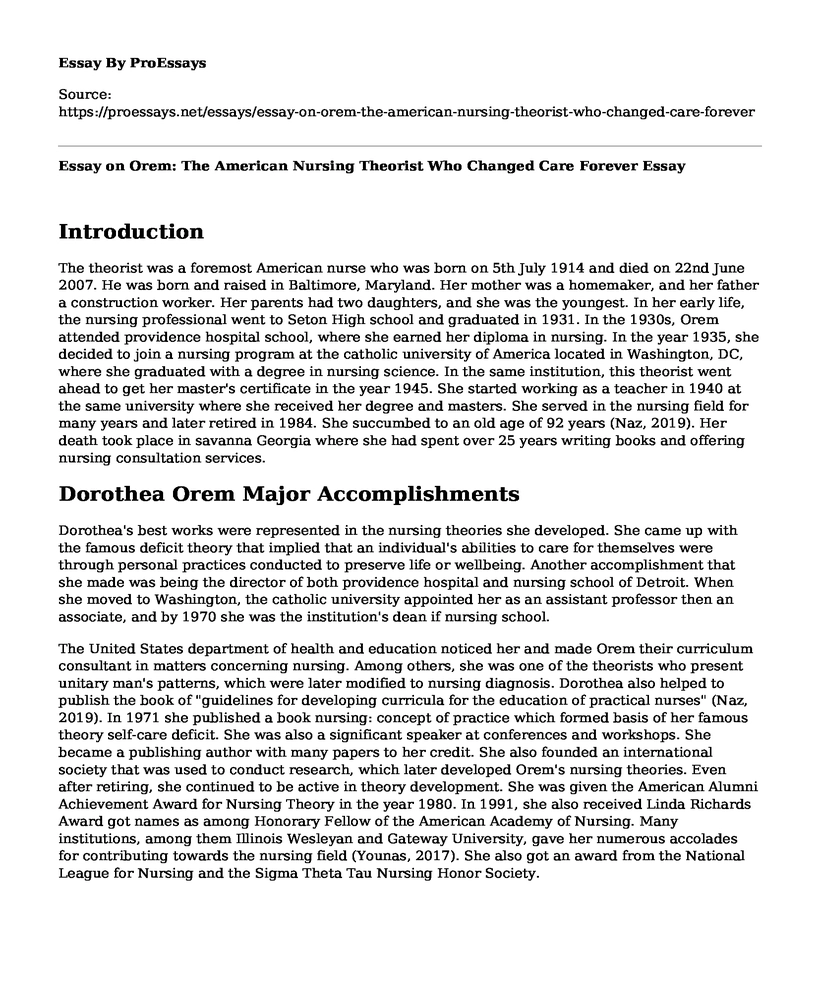Introduction
The theorist was a foremost American nurse who was born on 5th July 1914 and died on 22nd June 2007. He was born and raised in Baltimore, Maryland. Her mother was a homemaker, and her father a construction worker. Her parents had two daughters, and she was the youngest. In her early life, the nursing professional went to Seton High school and graduated in 1931. In the 1930s, Orem attended providence hospital school, where she earned her diploma in nursing. In the year 1935, she decided to join a nursing program at the catholic university of America located in Washington, DC, where she graduated with a degree in nursing science. In the same institution, this theorist went ahead to get her master's certificate in the year 1945. She started working as a teacher in 1940 at the same university where she received her degree and masters. She served in the nursing field for many years and later retired in 1984. She succumbed to an old age of 92 years (Naz, 2019). Her death took place in savanna Georgia where she had spent over 25 years writing books and offering nursing consultation services.
Dorothea Orem Major Accomplishments
Dorothea's best works were represented in the nursing theories she developed. She came up with the famous deficit theory that implied that an individual's abilities to care for themselves were through personal practices conducted to preserve life or wellbeing. Another accomplishment that she made was being the director of both providence hospital and nursing school of Detroit. When she moved to Washington, the catholic university appointed her as an assistant professor then an associate, and by 1970 she was the institution's dean if nursing school.
The United States department of health and education noticed her and made Orem their curriculum consultant in matters concerning nursing. Among others, she was one of the theorists who present unitary man's patterns, which were later modified to nursing diagnosis. Dorothea also helped to publish the book of "guidelines for developing curricula for the education of practical nurses" (Naz, 2019). In 1971 she published a book nursing: concept of practice which formed basis of her famous theory self-care deficit. She was also a significant speaker at conferences and workshops. She became a publishing author with many papers to her credit. She also founded an international society that was used to conduct research, which later developed Orem's nursing theories. Even after retiring, she continued to be active in theory development. She was given the American Alumni Achievement Award for Nursing Theory in the year 1980. In 1991, she also received Linda Richards Award got names as among Honorary Fellow of the American Academy of Nursing. Many institutions, among them Illinois Wesleyan and Gateway University, gave her numerous accolades for contributing towards the nursing field (Younas, 2017). She also got an award from the National League for Nursing and the Sigma Theta Tau Nursing Honor Society.
Impact on Today's Nursing Practice
The self-care nursing theory has been used broadly in practical healthcare settings. It is used to show that patients should try and portray the best versions of themselves despite illnesses. Such a notion is being applied in rehabilitation centers where individuals are urged to continue caring for their bodies. They should do so even when the therapist or psychologist complete canceling sessions. Through the self-care deficit theory, children and the elderly are supposed to receive care from those they live with (Naz, 2019). Parents should provide this life-preserving care to their young ones to promote the recovery process. Nurses cannot be able to follow each patient's home and keep tabs of their well-being. Hence, family members and friends should be able to provide genuine care.
References
Naz, S. (2019). Application of Dorothea Orem's Theory into Nursing Practice. Journal of Rehman Medical Institute, 3(3-4). Retrieved from https://www.jrmi.pk/jrmi/article/view/126
Younas, A. (2017). A foundational analysis of Dorothea Orem's self-care theory and evaluation of its significance for nursing practice and research. Creative nursing, 23(1), 13-23. Retrieved from https://connect.springerpub.com/content/sgrcn/23/1/13
Cite this page
Essay on Orem: The American Nursing Theorist Who Changed Care Forever. (2023, Mar 13). Retrieved from https://proessays.net/essays/essay-on-orem-the-american-nursing-theorist-who-changed-care-forever
If you are the original author of this essay and no longer wish to have it published on the ProEssays website, please click below to request its removal:
- Adequate Staffing vs. Inadequate Staffing in Nursing - Term Paper
- Research Paper on Amyotrophic Lateral Sclerosis
- Paper Example on Community Diagnosis for Sentinel City
- Nutritional Communication and Human Services Essay
- Research Paper on Pregnancy Induced Pre-Eclampsia
- Essay on COVID-19: Dysfunction and Denial - US on Course to See More Deaths
- Keith's Journey: Assessing His Economic, Cultural, & Health Needs - Essay Sample







